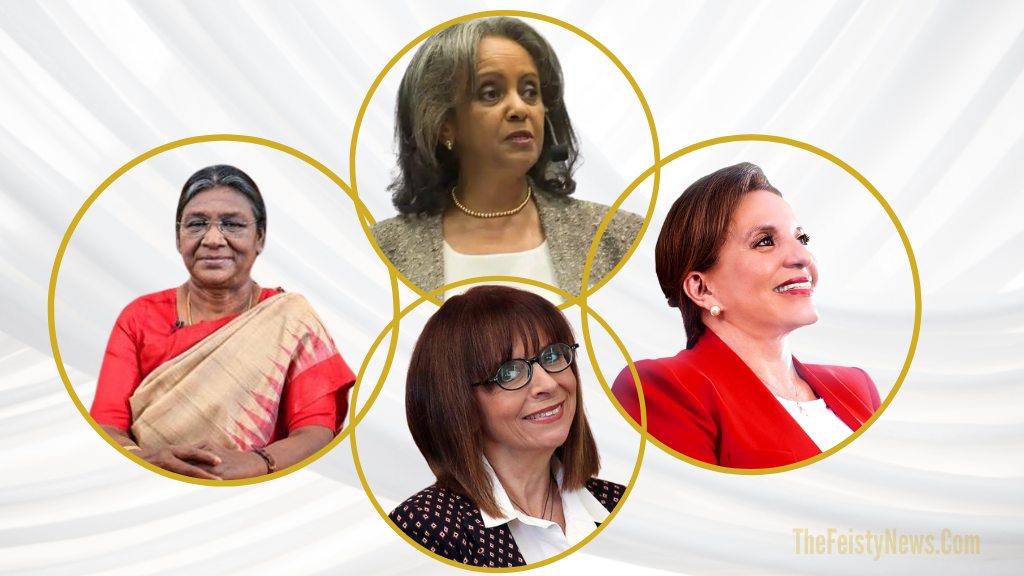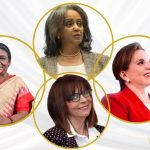Women have increasingly assumed the highest political offices, breaking barriers and challenging traditional norms. The presence of female heads of state is a testament to the progress made towards gender equality and the recognition of women’s capabilities in steering nations through complex challenges. The FEISTY News presents a comprehensive list of every female president in the world.
Sandra Mason – Barbados
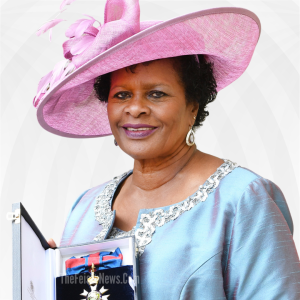
Dame Sandra Prunella Mason, a distinguished figure in Barbadian legal and political circles, has achieved notable milestones in her career. In 2008, she broke barriers as the first woman appeals judge on the Barbados Court of Appeals, showcasing her legal expertise and commitment to justice. Subsequently, Mason served as Acting Governor-General in 2012, further solidifying her reputation as a capable and trustworthy leader.
In 2014, Dame Mason expanded her influence to the international stage by becoming the first Barbadian member of the Commonwealth Secretariat Arbitral Tribunal in London, where she played a vital role in resolving contract disputes among Commonwealth nations.
Her distinguished career reached its pinnacle in 2021 when Barbados transitioned to a republic, and Dame Mason assumed the role of the nation’s first president. This historic moment marked the peak of her exceptional journey in public service.
Serving as Barbados’s eighth and final governor-general from 2018 to 2021, Dame Mason secured widespread support, obtaining a two-thirds majority vote in both the Senate and the House of Assembly during her transformative presidency.
Beyond her professional achievements, Dame Mason values her role as a devoted mother to her biological son, Matthew, adding a personal dimension to her exemplary narrative of leadership and resilience.
Sahle-Work Zewde – Ethiopia
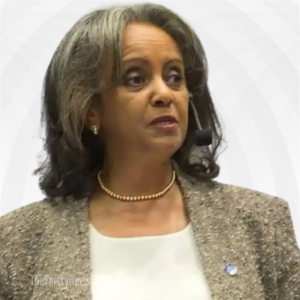
Sahle-Work Zewde inaugurated as Ethiopia’s first female president on October 25, 2018, embodies a groundbreaking career in diplomacy and public service. Born in Addis Ababa in 1950, Zewde’s educational journey led her to France, where she studied natural science before returning to Ethiopia to embark on a career at the Ministry of Education.
As a diplomat, she became the second woman to represent Ethiopia as an ambassador, serving in Senegal, Djibouti, and within the Intergovernmental Authority on Development (IGAD) in East Africa. Her diplomatic acumen extended to key roles such as Ambassador to France and Permanent Representative to UNESCO from 2002 to 2006.
Before assuming the presidency, Zewde played a crucial role in international peace-building, leading the United Nations Integrated Peace-building Office in the Central African Republic.
In 2018, she was appointed Special Representative to the African Union and head of the United Nations Office to the African Union, attaining the rank of Under-Secretary-General.
Proficient in Amharic, English, and French, President Sahle-Work Zewde’s diverse career reflects her commitment to diplomacy, education, and fostering peace within Ethiopia and on the global stage.
Salomé Zourabichvili – Georgia
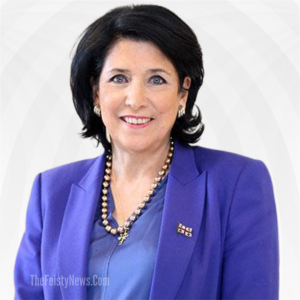
Salomé Zourabichvili assumed the presidency of Georgia on December 16, 2018, inaugurating a new era as the country transitioned to a parliamentary system under the 2018 constitution. Her historic term, set to be the lengthiest in Georgia’s history, is slated to extend until 2024 due to the constitutional changes.
A former French diplomat with Georgian roots, Zourabichvili embarked on Georgian politics in 2004, serving as the Foreign Affairs Minister after a distinguished career in France’s diplomatic corps.
Known for her critique of bureaucratic constraints and corruption during Mikheil Saakashvili’s leadership, she transitioned to become an opposition leader in 2006 before joining the Georgian Dream political coalition as an independent Member of Parliament in 2016.
Her non-partisan victory in the 2018 election, securing 60% of the vote, marked her as the second non-partisan President of Georgia, succeeding her predecessor, Giorgi Margvelashvili.
Despite the limitations of her office compared to previous presidents, Zourabichvili’s term commenced with a significant move—a commitment to investigating the death of former President Zviad Gamsakhurdia. This initiative gathered general support, demonstrating her commitment to transparent governance and setting a promising tone for her presidency.
Katerina Sakellaropoulou – Greece

Born on May 30, 1956, in Thessaloniki, Greece, Katerina Sakellaropoulou is celebrated as the nation’s inaugural female president. Her early years were spent in her hometown before her family relocated to Athens in 1964.
After graduating from the Arsakeio School, Psychiko, in 1974, Sakellaropoulou pursued her legal studies at the National and Kapodistrian University of Athens, culminating in her successful completion in 1978.
Sakellaropoulou’s journey began in 1982 when she was appointed Assistant Judge at the Council of State, the Supreme Administrative Court of Greece.
Over the years, she demonstrated her expertise in education, civil service, local government, and environmental law. Notably, she held the position of President of the Council of State from October 17, 2018, until February 11, 2020.
In addition to her legal knowledge, Sakellaropoulou is recognized as an author, particularly on constitutional and environmental law. Beyond her professional achievements, she takes pride in her role as a mother to her daughter, Niovi.
On January 22, 2020, Sakellaropoulou etched her name in history by securing an overwhelming 261 votes out of 300, becoming the first female president of the Hellenic Republic. She officially assumed office on March 14, 2020, following her oath before the Parliament.
Xiomara Castro – Honduras
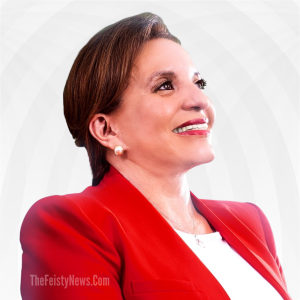
In a groundbreaking moment for Honduras, Xiomara Castro made history as she was sworn in as president in January 2022, marking the first woman to ascend to this prominent role. Her electoral triumph was noteworthy, securing an unprecedented 1.7 million votes, the largest mandate in Honduras’ electoral annals.
Before her presidential tenure, Castro served as the first lady during her husband Manuel Zelaya’s presidency, shortened by a coup d’etat in 2009.
Castro’s presidential campaign centered on a platform dedicated to advancing women’s rights, a critical issue in Honduras characterized by alarming rates of femicide and stringent abortion policies.
Despite the initial optimism surrounding her presidency, concerns emerged by December 2022 as a significant number of the pledged initiatives focusing on women had yet to be implemented. This delay has resulted in a decline in public confidence regarding the likelihood of Castro delivering on her campaign promises, underscoring the challenges inherent in addressing gender equality issues within the unique socio-political landscape of Honduras.
Katalin Novák – Hungary
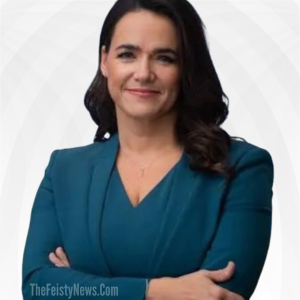
Hungary witnessed a groundbreaking moment on March 10, 2022, as Katalin Novák secured the title of Hungary’s inaugural female president through a confidential parliamentary vote. This pivotal decision, made by the Hungarian Parliament, indicated a transformative shift in the nation’s political panorama, designating Novák as the head of state for a five-year term.
Novák took the oath of commitment, marking a historic step in Hungary’s political history as she assumed the presidency on May 10, 2022.
Born on September 6, 1977, in Szeged, Katalin Novák is an accomplished economist who completed her studies at the University of Economic Sciences and Public Administration in Budapest and the University of Szeged. Her academic journey extended to Paris, where she pursued studies on a scholarship.
Commencing her professional career in 2001 at the Ministry of Foreign Affairs, Novák became an adviser to the Minister of Foreign Affairs from 2010 to 2012. Her dedicated service continued as the Head of the Cabinet of Minister Zoltán Balog from 2012 to 2014 within the Ministry of Human Capacities. Significant roles included Secretary of State for Family and Youth Affairs from 2014 to 2020 and Minister for Families from 2020 to 2021.
Proficient in English, French, and German, Novák’s global exposure has contributed to her comprehensive leadership style. Serving as a member of the Hungarian National Assembly since 2018, she brings a wealth of experience to the presidency. A mother of two boys and a girl, Novák commits to familial and public service.
Droupadi Murmu – India
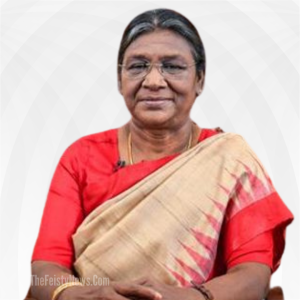
Assuming as the 15th President of India on July 25, 2022, Smt. Droupadi Murmu’s journey is marked by resilience and a dedication to public service.
Born in Uparbeda village, Mayurbhanj, Odisha, on June 20, 1958, she overcame problems to become the first woman from her village to attain a college education, earning a Bachelor of Arts degree from Ramadevi Women’s College in Bhubaneswar.
Smt. Murmu began her professional career as a Junior Assistant in the Irrigation and Power Department, later serving as an honorary teacher at Sri Aurobindo Integral Education Centre, Rairangpur.
She was elected to the Odisha Legislative Assembly in 2000, serving two terms and receiving the Pandit Nilkanth Das – Best Legislator Award in 2007.
Appointed Governor of Jharkhand in 2015, she became the first woman Governor of a tribal-majority state, earning acclaim for her commitment to constitutional values and tribal rights.
Married in 1981, she is the mother of a daughter, Smt. Itishree Murmu and son-in-law, Shri Ganesh Hembram, a rugby player.
Maia Sandu – Moldova
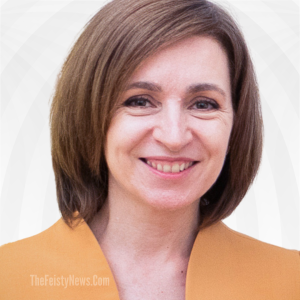
Born on May 24, 1972, in Risipeni village, Falesti district, Maia Sandu has become a prominent figure in Moldovan politics. After her early education, she graduated from the Academy of Economic Studies of Moldova in 1994, specializing in Management.
Sandu began her professional journey at the Ministry of Economy, holding roles such as Consultant and Deputy Head of Department from July 1994 to March 1998.
Dedicating herself to economic development, she worked as an economist at the World Bank Office in Chisinau from March 1998 to August 2005.
Her political journey includes serving as Moldova’s Minister of Education and founding the Action and Solidarity Party (PAS) in May 2016.
Fluent in Romanian, English, and Russian, Sandu’s diverse expertise and extensive experience were acknowledged when she was sworn in as Moldova’s President on December 24, 2020, following her victory in the November 15, 2020, presidential elections.
Dina Boluarte – Peru
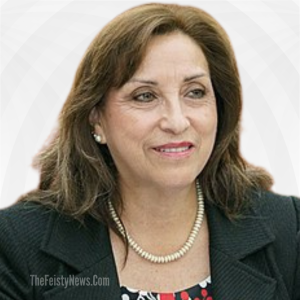
Dina Boluarte, born on May 31, 1962, in Chalhuanca, Peru, created history in December 2022 as she became Peru’s inaugural female president, succeeding President Pedro Castillo, who was dismissed by Congress.
Growing up as the youngest among 14 siblings in a rural setting, Boluarte faced challenges but went on to pursue higher education in nursing and law. Fluent in both Quechua and Spanish, she joined politics in her 50s, aligning with the Free Peru party.
Despite initial electoral setbacks, Boluarte’s trajectory shifted when she assumed the presidency amid a political crisis in December 2022.
Castillo’s presidency was marked by tumult, facing impeachment attempts and corruption allegations.
Boluarte served as his first vice president and later as the minister for development and social inclusion, representing Peru at international forums. However, their political alliance deteriorated, leading to Boluarte’s expulsion from Free Peru and her resignation from the cabinet in November 2022.
When Castillo dissolved the legislature, Boluarte denounced it as a coup. The following events saw her unexpectedly rise to the presidency as Congress voted to remove Castillo. The transition sparked protests and controversy, with accusations of accommodating right-wing interests and abandoning leftist principles, adding
Author Profile
Latest Entries
 SportsNovember 19, 2023Stylish Female Basketball Coaches Making a Statement On and Off the Court
SportsNovember 19, 2023Stylish Female Basketball Coaches Making a Statement On and Off the Court LifestyleNovember 19, 2023Wearable technology is changing the way we engage with the world
LifestyleNovember 19, 2023Wearable technology is changing the way we engage with the world PoliticsNovember 17, 2023Women Leading Nations: Every Female President in the World
PoliticsNovember 17, 2023Women Leading Nations: Every Female President in the World HealthNovember 17, 2023What is Medical Grade Retinol & Why Do Women Use it?
HealthNovember 17, 2023What is Medical Grade Retinol & Why Do Women Use it?


